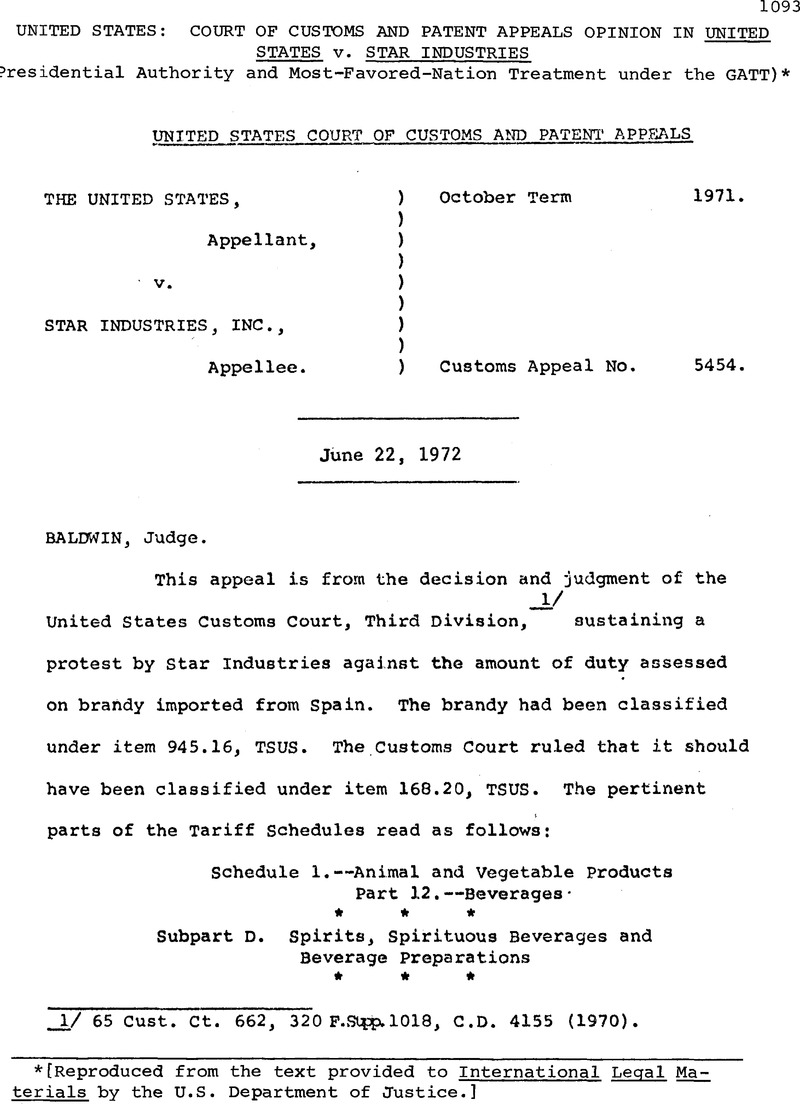No CrossRef data available.
Published online by Cambridge University Press: 04 April 2017

[Reproduced from the text provided to International Legal Materials by the U.S. Department of Justice.]
2 77 Stat. 1035 (1963).
3 For a discussion of the history of the proclamation, see Walker, Dispute Settlement; The Chicken War, 58 Am. J. Int’l L. 671 (1964) [hereinafter Walker].
4 Walker, supra, 58 Am. J. Int’l L. at 671.
5 Walker, supra, 58 Am. J. Int’l L. at 673-85; J. Jackson, World Trade and the Law of GATT, 174-75, 325-26 (1969) [hereinafter Jackson] Comment, Retaliation in International Trade: The Scope of Executive Discretion in Its Choice of Weapons, 4 Law & Pol. Int’l Bus. 156, 159 (1972) [hereinafter Comment].
6 See 28 Fed. Reg. 8066 (1963). In addition to brandy, the rates of duty on potato starch, dextrine and modified starches, and trucks valued at $1000 or more were increased by Proclamation No. 3564.
According to Walker, supra, the overall effect of the proclamation on countries which are not members of the EEC has been minor. 58 Am. J. Int’l L. at 681.
7 October 30, 1947, 61 Stat. A3, T.I.A.S, No. 1700.
8 See GATT, Annex I, Notes and Supplementary Provisions, Notes 5-7 to Article XXVIII (1).
9 An argument can be made that most-favored-nation treatment is implied in the language of Article XXVIII (3). Cf. Comment, supra, 4 Law & Pol. Int’l Bus at 164-65; Walker, supra, 58 Am. J. Int‘l L. at 681-82.
10 W. Bishop, International Law, 158 (2d ed. 1962). See generally Jackson, supra, at 249-73; GATT Secretariat, The Most-favoured-nation Clause in GATT, 4 J. World Trade L. 791 (1970).
11 See GATT Secretariat, supra, 4 J. World Trade L. at 795-801; Jackson, supra, at 2 70-72.
12 See 18th Meeting of the Tariff Agreement Committee. U.N. Doc. EPCT/TAC/PV. 18 (1947). This is one of a series of documents which have been called the “Primary Source for Drafting of GATT.” Jackson, supra, at 904.
13 Id. The latter phrase or its equivalent has been retained in sections of the GATT which do provide exceptions to the most-favored-nation principle. See, e.g., GATT Articles XVIII(21), XIX(3)(a) and XXIII(2).
14 S. Rep. No. 2059, 87th Cong. 2d Sess. 2-3 (1962).
15 Such denial might be appropriate, for example, in cases arising under one of the GATT Articles which allows an exception to the most-favored-nation principle, such as Article XXIII. Cf. Comment, supra, 4 Law & Pol. Int’l Bus at 165-66.